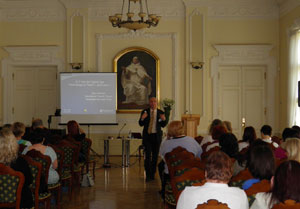 ELT into the Digital Age
ELT into the Digital Age
I did talks on the above theme at two different conferences last month: in mid May at the Language Teachers’ Association of Lithuania (LKPA) conference in lively Kaunas (where there was a street festival going on with a concert one evening by an Irish band doing Beatles golden oldies followed by fireworks) and at the end of the month in Hungary at a Cambridge conference on Digital Materials in beautiful Budapest (Buda with the castle and old city is on the hilly right bank of the Danube, while Pest is on the more modern and flat left bank).
Now I don’t know if you are a ‘digital immigrant’ like me, i.e. I didn’t grow up with computers as my two kids did, but rather migrated into the digital world. Yes, I remember life before computers, before mobile phones; why I even remember suitcases without wheels! But probably most of your students will be ‘digital natives’. BTW: How do you tell a digital native from a digital immigrant? Well, one way to think about the difference as mentioned by Marc Prensky (who apparently coined the terms) during his plenary session at IATEFL UK 2009 in Cardiff is this: Do you print out your emails? If so, you’re probably not a digital native.
During my talks in Lithuania and Hungary, we looked at the evolution of what used to be called multimedia but is now of course called IT, or better, at least in our field, ITC (Information and Communication Technology): from CD-ROMs and DVD-ROMs, for self-study and independent, autonomous learning, to the web. Both Web 1.0 (course nobody called it that back then at the beginning of the intranet) which was sort of like a tap that you turned on and downloaded stuff — but couldn’t put anything back up the pipe. And Web 2.0 with social networking tools so you can now not only download things but upload things to share (think Facebook, YouTube, Twitter et al) sort of like an interactive, sharing teachers’ room. The Cambridge ELT site www.cambridge.org/elt lets you do it all: with dedicated Facebook, YouTube and Twitter links as well as both Student and Teacher Resource Zones for materials to download and interactive activities including various blogs such as this one by yours truly.
We also looked at the exciting new English360 platform (a joint venture involving Cambridge University Press) which lets teachers create their own courses by choosing and downloading activities from selected Cambridge ELT materials and other teachers’ materials as well as uploading their own materials in order to create bespoke courses — and then, if they want, share their materials with colleagues in their institutions or indeed with teachers around the world (you can even request copyright on materials you upload and maybe get some royalties back). Have a look at www.english360.com – it’s free for teachers/educators and when your students/learners enrol, they then each pay a modest fee.
We also talked about blended learning — which in fact has existed since Plato wrote down Socrates’ dialogues (the latter as you know believed exclusively in face-to-face tuition) but has evolved with technology from books through radio and television to audio and video cassettes (and mustn’t forget the old, friendly photocopier) and CDs and DVDs to CD-/DVD-ROMs to online materials. Of course when we talk about blended learning now we mean (ready for a long definition?): instruction through a blend of delivery modes mixing face-to-face instruction with significant online self-study where the self-study element is conducted via a computer through a Learning Management System (LMS) providing tracking and reporting tools for teachers and learners. (Whew!) As an example I mentioned the flexible Cambridge Financial English blended-learning course; if interested, have a look at http://www.financialenglish.org/.
And we discussed ‘Freemium’ and ‘Premium’ and the idea that, although most everything at least at the beginning of the web was free, the present challenge for, say, the newspaper as well as the publishing industries is to have users pay a little to access more than just the basic free site. Have a look at the free Cambridge Dictionaries Online dictionary.cambridge.org to see what I mean. (And you don’t have to look at the Google ads; I usually don’t notice them on that site or others — then of course I’m not a digital native…
So, ‘ELT into the Digital World’: maybe a lot of us ain’t completely there yet, but, hey, we’re — i.e. you’re — necessarily on the way.
Gary Anderson, Cambridge ELT International Teacher Trainer



 Posted by internationalteachertrainer
Posted by internationalteachertrainer